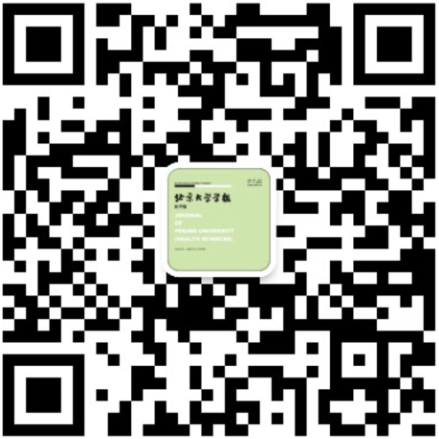北京大学学报(医学版) ›› 2020, Vol. 52 ›› Issue (5): 881-885. doi: 10.19723/j.issn.1671-167X.2020.05.014
北京某高校医学院师生营养知信行水平及其影响因素
- 1.北京大学医学部总务处
2.北京大学公共卫生学院
3.北京大学医学部国际合作处,北京 100191
Nutritional knowledge, attitudes and dietary behaviors of teachers and students in a medical college in Beijing and their influencing factors
Shuang-jia WANG1,2,Ting-ting WANG3,Jun-bo WANG2,∆( )
)
- 1. Office of General Service, Peking University Health Science Center
2. Peking University School of Public Health
3. Office of International Cooperation, Peking University Health Science Center, Beijing 100191, China
摘要:
目的:了解北京某高校医学院在校师生膳食营养知识、态度及行为情况并探究其影响因素,为改善师生营养观念、开展学校营养教育工作提供依据。方法:以北京某高校医学院在职教师,一、二年级硕士研究生,一、二年级博士研究生和一至三年级本科生为研究对象,采用等比例分层整群抽样的方法抽取师生样本,以电子问卷方式进行调查。组间均数比较采用t检验或方差分析,采用多元线性回归分析营养知识、态度及行为(knowledge, attitude and practice,KAP)评分影响因素。结果:北京某高校医学院师生营养知识平均得分为(5.7±1.5)分;营养知识知晓率为57.3%。营养态度平均得分为(8.3±3.0)分;营养行为平均得分为(5.1±2.0)分。总体营养KAP平均得分为(19.1±4.6)分。其中教师得分(19.9±5.2)高于学生得分(18.9±4.5),女性得分(19.5±4.5)高于男性得分(18.4±4.5),差异均有统计学意义(P<0.05);博士研究生的营养态度、营养行为得分及KAP总分均高于本科生及硕士研究生(P<0.01)。结论:北京某高校医学院在校师生营养态度较为端正,营养知识有待进一步加强,在营养行为上尚有一些不合理之处。性别、身份、学位是影响营养知信行得分的主要影响因素。学校应积极开展营养教育宣传,提高师生营养知识,纠正不良饮食习惯,助力健康中国行动建设。
中图分类号:
- R151.4+2
| [1] |
Gakidou E, Afshin A, Abajobir AA, et al. Global, regional, and national comparative risk assessment of 84 behavioural, environmental and occupational, and metabolic risks or clusters of risks, 1990-2016: a systematic analysis for the global burden of disease study 2016[J]. Lancet, 2017,390(10100):1345-1422.
doi: 10.1016/S0140-6736(17)32366-8 pmid: 28919119 |
| [2] |
Lock K, Smith RD, Dangour AD, et al. Health, agricultural, and economic effects of adoption of healthy diet recommendations[J]. Lancet, 2010,376(9753):1699-1709.
doi: 10.1016/S0140-6736(10)61352-9 pmid: 21074259 |
| [3] | 健康中国行动促进委员会. 健康中国行动 (2019-2030)[EB/OL]. (2019-07-15)[2020-02-25]. http://www.gov.cn/xinwen/2019-07/15/content_5409694.htm. |
| [4] | 武颂文, 杨年红, 王重建, 等. 医学生营养知识及饮食行为对营养状况的影响[J]. 中国学校卫生, 2006,27(2):103-104. |
| [5] | 王运良, 孙翔云, 万修伟, 等. 2039名大学生营养知识态度及饮食行为调查[J]. 中国学校卫生, 2010,31(1):25-26. |
| [6] | 付蕾, 徐上知, 冯刚玲, 等. 石河子大学学生营养知识态度膳食行为状况[J]. 中国学校卫生, 2014,35(5):649-650. |
| [7] |
张静, 陈幕华, 胡娉婷, 等. 医学生营养状况及影响因素分析[J]. 中国公共卫生, 2008,24(11):1404-1405.
doi: 10.11847/zgggws2008-24-11-69 |
| [8] | 束莉, 马嬿, 赵文红, 等. 某医学院校大学生营养知识, 态度及饮食行为调查[J]. 蚌埠医学院学报, 2014,39(5):637-639. |
| [9] | 吕姝焱, 张红珍, 赵毅飞, 等. 洛阳市大学生营养知识态度行为与膳食结构调查[J]. 中国学校卫生, 2012,33(9):1056-1058. |
| [10] | 丁玉松, 杨坤, 马儒林, 等. 石河子大学少数民族医学生膳食和营养状况[J]. 中国学校卫生, 2012,33(8):901-903. |
| [11] | 陈天义, 刘希锋, 李锋, 等. 安徽理工大学学生营养知识、态度与膳食行为[J]. 中国学校卫生, 2005,26(11):907-908. |
| [12] | 李百花, 张秋香, 杜建平. 北京市某大专院校学生营养知识、态度及饮食行为调查[J]. 中国健康教育, 2009,25(6):447-449. |
| [13] | 宋建根, 姚应水, 梁雅丽, 等. 课堂教学对护理专业学生营养 KAP 干预效果评价[J]. 中国学校卫生, 2012,33(11):1372-1373. |
| [14] | 王运良, 孙翔云, 万修伟, 等. 营养健康教育对大学生营养 KAP 的影响[J]. 中国学校卫生, 2010,31(9):1044-1046. |
| [15] |
王南平, 郭秀. 健康教育对女大学生膳食营养的影响[J]. 中国公共卫生, 2003,19(5):635.
doi: 10.11847/zgggws2003-19-05-85 |
| [16] | 钱佳佳, 刘春芳, 王英, 等. 不同健康教育形式对卫校学生膳食行为的影响[J]. 中国学校卫生, 2018,39(7):987-989. |
| [1] | 张晓悦,林雨欣,蒋莹,张蓝超,董芒艳,池海谊,董浩宇,马利军,李智婧,常春. 自我效能在2型糖尿病患者自我管理能力和自我管理行为间的中介效应[J]. 北京大学学报(医学版), 2023, 55(3): 450-455. |
| [2] | 林浩,李菁华,杨潇,陈晓婷,史宇晖,常春,郝元涛,曹望楠. 中国成都男男性行为人群HIV暴露前预防用药行为-认知偏差现状及其影响因素[J]. 北京大学学报(医学版), 2023, 55(3): 511-520. |
| [3] | 袁婷婷,李燊,吴燕,吴海涛. 长期自由选择饮酒小鼠模型的建立及其行为学评价[J]. 北京大学学报(医学版), 2023, 55(2): 315-323. |
| [4] | 焦翠,王俭妹,况海霞,武志红,柳涛. CACNA1H基因敲除对小鼠孤独症样行为及海马神经元形态学的影响[J]. 北京大学学报(医学版), 2022, 54(2): 209-216. |
| [5] | 何珊,简伟研. 中国城镇化与健康相关行为关系分析:一项基于CHARLS数据的实证研究[J]. 北京大学学报(医学版), 2022, 54(2): 261-266. |
| [6] | 李远骋, 崔闻心, 郭雪儿, 朱璠, 刘思辰, 贾碧波, 汪培, 马迎华. 青年学生男男性行为人群中人类免疫缺陷病毒阳性与阴性者获得性免疫缺陷综合征(艾滋病)相关知识与行为比较[J]. 北京大学学报(医学版), 2021, 53(3): 511-517. |
| [7] | 史欣然,安美静,陈天娇,马军. 饮奶行为在家庭社会经济状况与儿童青少年体重指数间的中介作用[J]. 北京大学学报(医学版), 2021, 53(2): 308-313. |
| [8] | 那晓娜,朱珠,陈阳阳,王东平,王浩杰,宋阳,马晓川,王培玉,刘爱萍. 身体活动、静坐行为的时间分布与肥胖的关系[J]. 北京大学学报(医学版), 2020, 52(3): 486-491. |
| [9] | 白珊珊,莫思怡,徐啸翔,刘云,谢秋菲,曹烨. 大鼠咬合干扰致口颌面痛敏的自我赏罚实验行为学特点[J]. 北京大学学报(医学版), 2020, 52(1): 51-57. |
| [10] | 朱星昀,刘燕鹰,孙学娟,于萍,刘爽,付美艳,刘栩,任立敏,栗占国. 免疫球蛋白G4相关疾病患者发病形式及就诊行为特征分析[J]. 北京大学学报(医学版), 2018, 50(6): 1039-1043. |
| [11] | 吴双胜,杨鹏,李海月,马春娜,王全意. 传染病健康素养水平与传染病症状发生之间的相关性研究[J]. 北京大学学报(医学版), 2018, 50(5): 937-940. |
| [12] | 董彦会,宋逸,董彬,邹志勇,王政和,杨招庚,王西婕,李艳辉,马军. 2014年中国7~18岁学生血压状况与营养状况的关联分析——基于中国儿童青少年血压评价标准[J]. 北京大学学报(医学版), 2018, 50(3): 422-428. |
| [13] | 宋逸,雷园婷,胡佩瑾,张冰,马军. 2014年全国汉族中小学生身体素质现况分析[J]. 北京大学学报(医学版), 2018, 50(3): 436-442. |
| [14] | 刘胜兰,娜荷芽,李伟豪,云青萍,姜学文,刘婧楠,常春. 基于自我决定理论的糖尿病自我管理行为干预效果[J]. 北京大学学报(医学版), 2018, 50(3): 474-481. |
| [15] | 任巧萌,王丽敏,彭丹璐,郭岩. 中国成人糖尿病患者病情知晓对行为的影响[J]. 北京大学学报(医学版), 2017, 49(3): 451-454. |
|
||
